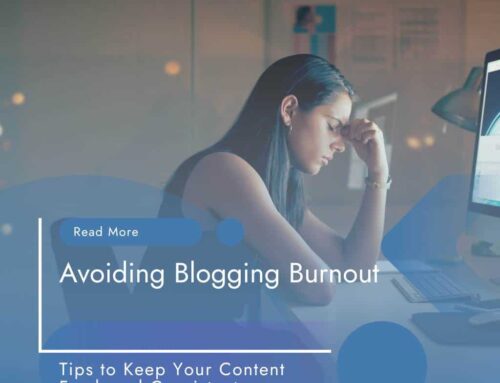Table of Contents
How often should you blog? A guide to creating a successful content strategy
Are you wondering how often you should be blogging? It’s a common question among content creators, and the answer isn’t always straightforward. The frequency at which you should publish blog posts depends on several factors, including your goals, audience, and available resources.
If you’re looking to increase website traffic and engagement, publishing new blog posts frequently can be beneficial. However, it’s important to strike a balance between quantity and quality. Posting too often can result in lower-quality content, which can ultimately harm your blog’s reputation. On the other hand, posting too infrequently can cause readers to lose interest and forget about your blog altogether. So, how often should you blog? Let’s explore some considerations to help you determine the best publishing frequency for your blog.

The Importance of Consistency
Consistency is a crucial factor to consider when it comes to blogging. It is not only about the frequency of your posts but also about the quality and relevance of the content. In this section, we will discuss why consistency matters, how it affects your audience, and how it affects SEO.
Why Consistency Matters
Consistency is important because it helps you establish a routine and build trust with your audience. When you consistently post high-quality content, your readers will come to expect it from you. This will help you build a loyal following and increase engagement on your blog.
Moreover, consistency also helps you stay on track with your goals. When you have a regular posting schedule, you are more likely to stick to it and achieve your objectives. This can help you grow your blog and reach a wider audience.
How Consistency Affects Your Audience
Your audience is the most important factor to consider when it comes to blogging. Consistency is crucial because it helps you build trust with your readers. When you post regularly, your readers will know when to expect new content from you. This can help you keep them engaged and interested in your blog.
Moreover, consistency can also help you establish yourself as an authority in your niche. When you consistently post high-quality content, your readers will come to see you as an expert in your field. This can help you build credibility and increase your influence.
How Consistency Affects SEO
Consistency is also important for SEO. Search engines like Google prefer websites that post high-quality content on a regular basis. When you consistently post new content, search engines will crawl your website more frequently. This can help you improve your search engine rankings and increase your visibility online.
Moreover, consistency can also help you improve your website’s user experience. When you post new content regularly, your readers will have a reason to keep coming back to your website. This can help you reduce your bounce rate and increase your time on page.
In conclusion, consistency is a crucial factor to consider when it comes to blogging. It can help you build trust with your audience, establish yourself as an authority, and improve your search engine rankings. Therefore, it is essential to develop a regular posting schedule and stick to it.

Factors to Consider
When deciding how often to blog, there are several factors to consider that can impact your decision. Here are some of the most important things to think about:
Your Goals and Niche
Your goals and niche are two of the most important factors to consider when deciding how often to blog. If your goal is to build a large audience quickly, you may want to blog more frequently. On the other hand, if you’re focused on creating high-quality content that resonates with your audience, you may want to blog less frequently.
Your niche is also important to consider. Some niches, like news and current events, require more frequent updates than others. If you’re in a niche that requires frequent updates, you may need to blog more often to stay relevant.
Your Resources
Your resources are another factor to consider when deciding how often to blog. If you have a large team of writers and editors, you may be able to blog more frequently than if you’re a solo blogger. Additionally, if you have a lot of time and energy to devote to your blog, you may be able to blog more frequently than if you have other commitments.
Your Competition
Your competition is also important to consider when deciding how often to blog. If your competitors are blogging frequently, you may need to blog more often to stay competitive. On the other hand, if your competitors are blogging less frequently, you may be able to blog less often and still stay competitive.
To get a better sense of how often your competitors are blogging, you can do some research to see how often they’re publishing new content. This can help you determine whether you need to increase or decrease your blogging frequency.
In summary, when deciding how often to blog, it’s important to consider your goals, niche, resources, and competition. By taking these factors into account, you can make an informed decision that will help you achieve your blogging goals.

Determining Your Blogging Schedule
How Often Should You Blog?
When it comes to determining how often you should blog, there is no one-size-fits-all answer. It ultimately depends on your goals, target audience, and available resources. However, as a general rule of thumb, it’s recommended that you publish at least one blog post per week.
Publishing high-quality content on a consistent basis can help you establish a loyal readership and improve your search engine rankings. However, don’t sacrifice quality for quantity. It’s better to publish one well-written and informative post per week than several mediocre ones.
Scheduling Your Posts
Once you’ve determined how often you want to blog, it’s important to create a schedule and stick to it. This will help you stay organized and ensure that you’re consistently publishing content.
Consider your audience and when they’re most likely to be online. For example, if your target audience is stay-at-home parents, you may want to publish your posts during the day when they have more free time. If your audience is primarily business professionals, you may want to publish your posts in the early morning or late afternoon.
Using an Editorial Calendar
An editorial calendar is a tool that can help you plan and organize your blog content. It allows you to schedule your posts in advance and ensure that you’re covering a variety of topics.
When creating your editorial calendar, consider the following:
- Your blogging goals
- Your target audience
- Relevant holidays and events
- Seasonal topics
- Your own availability and resources
There are many tools available to help you create and manage your editorial calendar, such as Monday, Trello, Asana, or even a simple spreadsheet.
In conclusion, determining your blogging schedule is an important part of creating a successful blog. By publishing high-quality content on a consistent basis and using tools like an editorial calendar, you can establish a loyal readership and achieve your blogging goals.

Creating Quality Content
Creating quality content is crucial to the success of your blog. Not only does it help you establish yourself as an authority in your niche, but it also helps you attract and retain readers. In this section, we’ll discuss why quality matters and provide tips on how to create content that your readers will love.
Why Quality Matters
Quality matters because it’s what sets your blog apart from the competition. When you create high-quality content, you’re showing your readers that you care about their experience and that you’re willing to put in the effort to provide them with valuable information. Quality content also helps you establish trust with your readers, which is essential if you want to build a loyal following.
Choosing the Right Topics
Choosing the right topics is essential if you want to create quality content. You should always aim to write about topics that are relevant to your niche and that your readers will find interesting. To come up with topic ideas, you can use tools like Google Trends or BuzzSumo to see what’s trending in your industry. You can also look at your competitors’ blogs to see what topics are getting the most engagement.
Check out my guide “21 Ideas For Blogging Beginners”
Writing Longer Posts
Writing longer posts can help you create more in-depth content that your readers will find valuable. However, it’s important to note that longer posts aren’t always better. You should always aim to provide value to your readers, regardless of the length of your post. If you can provide value in a shorter post, then do so.
Using Keywords
Using keywords is important if you want your blog to rank well in search engines. However, it’s important to use keywords in a natural way that doesn’t feel forced. You should also avoid keyword stuffing, which can actually hurt your search engine rankings.
Engaging Your Audience
Engaging your audience is essential if you want to build a loyal following. You should always aim to respond to comments and engage with your readers on social media. You can also ask your readers for feedback and use their suggestions to improve your blog.
In summary, creating quality content is essential if you want to build a successful blog. By choosing the right topics, writing longer posts, using keywords, and engaging your audience, you can create content that your readers will love.

Avoiding Blogging Burnout
The Risks of Overposting
Posting too often can lead to burnout, which can have a negative impact on your mental and physical health. Burnout can also affect the quality of your content and your ability to engage with your audience. It is important to find a posting frequency that works for you and your audience, while also taking care of your well-being.
Strategies for Avoiding Blogging Burnout
To avoid blogging burnout, consider the following strategies:
1. Create a Content Calendar
Creating a content calendar can help you plan your posts in advance, ensuring that you have a consistent posting schedule without feeling overwhelmed. This can also help you avoid posting similar content too frequently.
2. Take Breaks
It is important to take breaks from blogging to avoid burnout. This can include taking a day off from posting or taking a short break from blogging altogether. Use this time to recharge and come up with fresh ideas for your content.
3. Prioritise Self-Care
Taking care of yourself is crucial to avoiding burnout. This can include getting enough sleep, eating well, and taking time to exercise or engage in other activities that you enjoy. It is important to prioritise your well-being above your blog.
4. Set Realistic Goals
Setting realistic goals for your blog can help you avoid burnout. This can include setting a realistic posting schedule, as well as setting achievable goals for growth and engagement.
So, avoiding burnout is crucial to maintaining a successful blog. My recommendations include: Creating a content calendar, taking breaks, prioritising self-care, and setting realistic goals, you can find a posting frequency that works for you while also taking care of your well-being.

Measuring Success
As a blogger, it’s important to measure the success of your blog. This will help you understand what’s working and what’s not, and allow you to make informed decisions about your blogging strategy. Here are some ways to measure your success:
Tracking Your Statistics
One of the most important ways to measure your success is by tracking your statistics. This includes metrics such as pageviews, unique visitors, bounce rate, and time on site. By tracking these metrics, you can see how your blog is performing over time and identify any trends or patterns.
There are a number of tools available to help you track your statistics, including Google Analytics, which is free and easy to use. Once you’ve set up your account, you can track your metrics on a daily, weekly, or monthly basis, and use the data to make informed decisions about your blogging strategy.
Setting Goals and Milestones
Another important way to measure your success is by setting goals and milestones. This will help you stay focused and motivated, and give you a clear sense of direction for your blog.
When setting goals, it’s important to make them specific, measurable, achievable, relevant, and time-bound (SMART). This will help you track your progress and ensure that you’re moving in the right direction.
For example, you might set a goal to increase your pageviews by 20% over the next six months. To achieve this goal, you might focus on creating more high-quality content, promoting your blog on social media, and optimizing your website for search engines.
Measuring Your ROI
Finally, it’s important to measure your return on investment (ROI) for your blog. This includes both the financial and non-financial benefits of your blog.
Financial benefits might include revenue from advertising, affiliate marketing, or sponsored posts. Non-financial benefits might include increased brand awareness, social media followers, or email subscribers.
To measure your ROI, you’ll need to track your income and expenses related to your blog, and calculate your return on investment. This will help you understand the true value of your blog and make informed decisions about your blogging strategy.
In conclusion, measuring your success as a blogger is crucial for your growth and development. By tracking your statistics, setting goals and milestones, and measuring your ROI, you can ensure that you’re on the right track and making the most of your blogging efforts.
FAQS
Conclusion
In conclusion, the frequency at which you should blog depends on various factors, such as your niche, audience, and goals. However, consistency is key, and you should aim to publish quality content regularly. Here are some key takeaways to keep in mind:
- Determine your goals and audience: Before deciding on a blogging frequency, consider your goals and who you’re writing for. Are you aiming to drive traffic, establish your authority, or engage your audience?
- Quality over quantity: While it’s important to publish regularly, don’t sacrifice quality for quantity. Your readers will appreciate well-researched, informative, and engaging content that provides value.
- Create a content calendar: Planning your blog posts in advance can help you stay organised and on track. Use a content calendar to schedule topics, deadlines, and publication dates.
- Be realistic: Don’t overcommit yourself to a blogging schedule that you can’t maintain. Be realistic about how much time and effort you can dedicate to your blog.
- Monitor your analytics: Keep an eye on your blog’s analytics to see how your content is performing. Use this information to adjust your strategy and improve your results.
By following these tips, you can find the right blogging frequency for your needs and keep your audience engaged with your content.




